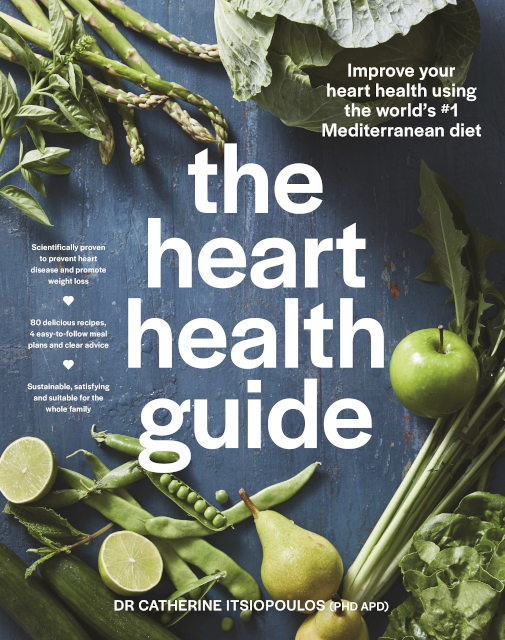The Hearth Health Guide Interview

The Mediterranean diet is the most researched, effective and accessible diet for dealing with a range of lifestyle diseases including cardiovascular disease (CVD).
Dr Catherine Itsiopoulos, Pro Vice Chancellor at Murdoch University, is a worldrecognised dietitian and expert on the Mediterranean diet.
In The Heart Health Guide, Catherine provides practical advice, based on up-tothe-minute research, that will help readers understand their condition and improve their health via diet, along with input from leading doctors.
Dr Catherine Itsiopoulos combines her expertise with a love of good food, which dates back to her early years growing up as part of a Greek-Australian family. Catherine has seen first-hand the benefits of the Mediterranean diet based on fresh vegetables and fruit, legumes, fish, nuts, extra virgin olive oil as the main dietary fat, and a moderately low intake of eggs, dairy and meat.
The Heart Health Guide contains 80 delicious recipes and detailed meal plans that provide guidance for the reader seeking to use the diet to improve their CVD outcomes and overall health.
Sustainable, satisfying and suitable for the whole family, the Mediterranean diet is recommended by cardiologists around the world and is proven to improve heart health, as much as it promotes long-term good health and wellbeing.
About the author:
Dr Catherine Itsiopoulos (PhD APD) is Pro Vice Chancellor of the College of Science, Health, Engineering and Education at Murdoch University (Western Australia). An accredited practising dietitian and a recognised expert in Dietetics, Catherine has international standing as a leader in Mediterranean diet research. Catherine has a particular interest in the Mediterranean diet in the prevention and management of heart disease and diabetes.
Catherine has authored over 70 scientific publications - presenting her research nationally and internationally - and has published two books, The Mediterranean Diet and The Mediterranean Diet Cookbook.
The Heart Health Guide
Author: Dr. Catherine Itsiopoulos
Pan Macmillan Australia
ISBN: 9781760785765
RRP: $34.99
Interview with Dr. Catherine Itsiopoulos
How important is our diet in relation to Heart Health?
Heart disease is a serious condition and continues to be the leading cause of death in Australia with more than 20 Australians dying of heart disease every day.
You are more likely to develop heart disease if you smoke, or have high blood pressure, high cholesterol, diabetes, or have a family history of heart disease.
Studies from around the world have shown that over 90 percent of heart disease is preventable by healthy diet and lifestyle habits such as not smoking, exercising regularly and eating a diet that is rich in plant foods, especially fresh fruits and vegetables.
Conversely a diet of highly processed foods rich in saturated fats and trans fats (animal fats), salt, and added sugars and low in fresh fruits and vegetables is associated with increased heart disease risk. This type of eating pattern can lead to obesity, high blood pressure, high cholesterol which in turn increase heart disease risk.
The Heart Foundation's Eating for Heart Health Guidelines recommend plenty of vegetables, fruits, wholegrains, lean protein sources such as fish, lean meat and poultry, low fat dairy foods, legumes, nuts, seeds, oils such as olive, and using herbs and spices instead of adding salt. These guidelines are based on the latest evidence of dietary patterns associated with heart health including the Mediterranean dietary pattern.
How does a Mediterranean diet help the prevention of Heart Disease?
The Mediterranean diet has consistently been shown to be protective for heart disease and the most remarkable evidence in support of the diet's cardioprotective effects is from a large Spanish study called the Prevencion con Dieta Mediterranea Study (PREDIMED). This study tracked the health outcomes of nearly 7500 people across Spain, with risk factors for heart disease such as obesity and high blood pressure, over a period of five years. People in the study were advised to follow a Mediterranean diet supplemented with 30 g nuts (walnuts, almonds, hazelnuts) per day or 1 litre of extra-virgin olive oil per week or a standard low-fat diet. At the end of the study, the people who followed a Mediterranean diet had a 30 per cent lower chance of dying from heart disease than those who followed the standard low-fat diet.
A Mediterranean diet is protective for heart disease because it is rich in heart protective nutrients with antioxidant and anti-inflammatory properties from extra virgin olive oil, nuts, seeds, fish and seafood, leafy greens, tomatoes, garlic and onions, herbs and spices, and fresh fruit, and low in highly processed high fat foods that are associated with heart disease. The antioxidant and anti-inflammatory elements of this dietary pattern prevent low grade inflammation which occurs in the coronary artery walls as the first step in atherosclerosis -the build up of fats in the artery wall that leads to blockage and heart attack. This dietary pattern is also protective for the risk factors leading to heart disease such as obesity (especially abdominal), high blood pressure and high cholesterol and dyslipidaemia (high triglycerides and low HDL (protective) cholesterol).
What was your inspiration to create The Heart Health Guide?
My interest in the health benefits of the Mediterranean diet spans over 20 years when I began my doctoral studies and realised that Greek immigrants to Australia were protected from early death from heart disease, and other chronic diseases, most likely due to their healthy Mediterranean diet habits. Although I grew up in a Greek Mediterranean family following this healthy diet it wasn't until years later as a researcher that I came to investigate and appreciate its health benefits.
The Heart Health Guide was inspired by a large multi-centre study that my colleagues and I are completing called the Australian Mediterranean (AUSMED) Heart Trial where we are investigating the effects of the traditional Mediterranean diet in preventing a second heart attack in people that have heart disease. I worked closely with my AUSMED Heart Trial colleagues to report the latest evidence and illustrate how this dietary pattern protects the heart in this guide.
The recipes in the Heart Health Guide were inspired by the wonderful recipes passed down by my beloved late mother Theano who was a very talented and fussy cook, and recipes were modernised by my gorgeous daughters Tiana and Vivienne who love to cook and they inspired many of the vegetarian and vegan-friendly recipes.
What tips can you share with us to change our diet and improve health?
The benefits of switching to a healthy diet for long term health is unquestionable but maintaining healthy dietary habits long term can be difficult due to so many factors such as lack of time to prepare healthy meals, not knowing what diet is the best one to follow, lack of confidence in the kitchen, boredom with diets that are tasteless, or many failed attempts at eating healthy in the past.
Following a healthy dietary pattern like the Mediterranean diet does not mean you have to slave over a hot stove for hours each day preparing complex dishes such as moussaka. You can leave the more complex dishes to weekends or days where you have more time up your sleeve.
You can follow some or all of the following tips to make your diet healthier and more Mediterranean:
- Enjoy fresh vegetables, including leafy greens and tomatoes, in abundance and flavour your foods with herbs and spices.
- Eat fresh fruit everyday and snack on dried fruit, nuts and seeds in between meals.
- Use extra virgin olive oil as the main fat in cooked meals and in salads, and the occasional fried foods.
- Eat vegetarian by incorporating at least two legume dishes per week as the main protein source.
- Enjoy fermented dairy foods like Greek-style plain yoghurt and crumble feta cheese into your salads.
- Try to have fish and seafood twice a week and include oily fish such as sardines or salmon.
- Eat smaller portions of lean meat by incorporating into tomato-based casseroles, and choose free range wherever possible, and keep processed meats to a minimum.
- Choose wholegrain bread and preferably sourdough to mop up juices from salads and casserole dishes.
- Enjoy wine (preferably red) in moderation, and always with meals, and try to have a couple of alcohol-free days per week.
10. Keep sweets for special occasions and try adding nuts, seeds, dried fruit and honey.
nuts and honey, but onlyn special occasions.
Where does your passion for Mediterranean food come from? Do any of these recipes hold memories for you?
Growing up in a Greek Mediterranean family in the Northern suburbs of Melbourne I was used to the Greek traditions of home cooked meals where vegetables (often from my father Thanassi's garden) were the hero of the meal. My father would tend to a large backyard garden (most Greek's used every inch of their land to grow anything they can eat such as tomatoes, cucumbers, onions, garlic, green beans, eggplants, fresh herbs and horta (wild edible greens) just to name a few). My mother would prepare the tastiest vegetable-based casseroles like fassoulakia yiaxni made with fresh green beans and a fresh tomato puree that we prepared in the backyard. I remember each autumn the whole extended family would get together and prepare the tomato puree from ripe fresh tomatoes (called saltsa) and we had a supply for the whole year. The taste of homemade tomato puree in casseroles and soups, as I have used in many of the recipes, reminds me of my childhood and especially baked eggs in tomato puree which was a favourite weekend lunch meal with crusty sourdough bread.
My career as a clinical dietitian and nutrition researcher has brought together my passion for Mediterranean food and to better understand the science behind its health benefits. I was privileged to meet a wonderful mentor early on in my career, Professor Kerin O'Dea AO who is recognised for her research on the health effects of traditional hunter-gatherer diets. Kerin inspired me to focus on healthy eating patterns and to look beyond nutrients and has mentored and supported my research career on the Mediterranean diet and the discovery of its health benefits.
Heart disease is a serious health issue that can mostly be prevented with a healthy diet and lifestyle.
Maintaining a healthy diet and lifestyle long term is important for heart health but can be difficult to commit to therefore it is important to make dietary changes that are effective and backed by scientific evidence (not passing fads), easy to follow, and enjoyable for the whole family.
The Heart Health Guide is an easy to follow guide that explains how a Mediterranean diet can help prevent and manage heart disease and easy steps for how you can be empowered to adopt this heart protective and tasty way of eating into your everyday life.
MORE



